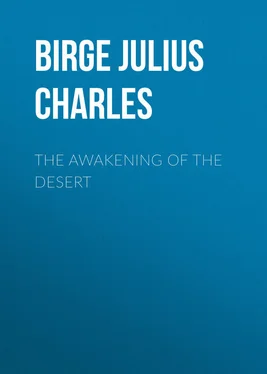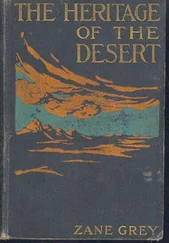Julius Birge - The Awakening of the Desert
Здесь есть возможность читать онлайн «Julius Birge - The Awakening of the Desert» — ознакомительный отрывок электронной книги совершенно бесплатно, а после прочтения отрывка купить полную версию. В некоторых случаях можно слушать аудио, скачать через торрент в формате fb2 и присутствует краткое содержание. Жанр: foreign_language, foreign_antique, foreign_prose, на английском языке. Описание произведения, (предисловие) а так же отзывы посетителей доступны на портале библиотеки ЛибКат.
- Название:The Awakening of the Desert
- Автор:
- Жанр:
- Год:неизвестен
- ISBN:нет данных
- Рейтинг книги:5 / 5. Голосов: 1
-
Избранное:Добавить в избранное
- Отзывы:
-
Ваша оценка:
- 100
- 1
- 2
- 3
- 4
- 5
The Awakening of the Desert: краткое содержание, описание и аннотация
Предлагаем к чтению аннотацию, описание, краткое содержание или предисловие (зависит от того, что написал сам автор книги «The Awakening of the Desert»). Если вы не нашли необходимую информацию о книге — напишите в комментариях, мы постараемся отыскать её.
The Awakening of the Desert — читать онлайн ознакомительный отрывок
Ниже представлен текст книги, разбитый по страницам. Система сохранения места последней прочитанной страницы, позволяет с удобством читать онлайн бесплатно книгу «The Awakening of the Desert», без необходимости каждый раз заново искать на чём Вы остановились. Поставьте закладку, и сможете в любой момент перейти на страницу, на которой закончили чтение.
Интервал:
Закладка:
Having obtained all possible particulars concerning the situation, we found ourselves very much in the frame of mind of the average small boy, who, learning that a fight is on around the corner, is disposed to rush immediately to the center of disturbance. We had no definite knowledge concerning the whereabouts of other trains moving westward, with one of which, according to Government orders, we ought perhaps to have been traveling. There certainly was no wagon in sight between us and the place where the white sandy trail curved up the slopes of the bluffs beyond and was lost to sight some miles westward.
We threshed out the matter thoroughly in the presence of our new friends, and all members of our party were more and more inclined to press forward as rapidly as possible, fearing we might fail to witness something that might be of interest; and all this directly against valuable advice given in the Book of Proverbs. When we thanked the gentlemen and bade them good-bye, they wished us good luck and a safe trip, and as a final admonition urged us to be on our guard.
Passing over the western extremity of the bluffs, where the trail begins to descend again into the Platte valley, our train came into view of the little house well known as Baker's ranch. Beyond it flowed the muddy Platte, the channel of which could be traced many miles of its course. It then appeared to the eye as if divided into many channels, which formed numerous islands or sand bars. Many of these islands in the Platte are almost as unstable as the ancient Delos, or as the waters that sweep over them in flood time, appearing in one place today, in another tomorrow, because the quicksands are always rolling and shifting under the action of the swift current. On the other hand, the clayey formation in the valley of the lower Platte, termed loess by geologists, seems throughout that course of the river to assume a crystalline form; and as the stream washes away its shores, it carves out many perpendicular banks having the columnar form of basaltic cliffs, but of a neutral red color.
As from the hills we looked with our field glass to a point beyond the ranch, we observed, and perhaps for the first time along the river, a bank that was low and easily fordable, for we saw two mounted Indians rapidly enter the stream and ride through it to a large island, which like an oasis in the desert was well covered with verdure. Upon the island was an Indian village; and beyond the island, and beyond the further channel of the sparkling river, the brown plain gradually sloped upward to the table-lands at the North.
Clustered rather closely together upon the island, and standing out clearly in the bright sunlight, were seventy white circular lodges, each tapering gracefully to a point, and appearing from far away like a crest of fringe; at the top of each lodge, were the lodge poles, with their small ends crossed at the apex. Around and among the tents, was a scene of animation in which warriors, squaws, and children confusedly intermingled like a legion of busy red ants in a city of ant hills, each forming a moving dot of bright color. All this striking and beautiful scene, as more clearly discerned through the field glass, resembled rather a motion picture than a scene in real life, for not a sound reached us through the still air from that cluster of Indian tepees. As the Sioux lodges average about ten occupants each, it appeared safe to estimate the population of the village at about 700. They were men of the western twilight, as fantastically named by Karl G. Carus.
Having surveyed rather carefully the general landscape, our party proceeded observantly until we lined up in front of Baker's ranch. We, who were on horseback, alighted, and passing unmolested by a dozen athletic red warriors, we entered the open door. To our surprise we found the floor nearly covered with Indians reclining in various postures. Stepping over two or three of these recumbent forms, an act that did not make them move a hair's breadth, we picked our way toward the corner of the room, where we met the valiant Lew Baker, then in the prime of his young manhood. The counter extended along the east side of the building, after the fashion of many country stores, and behind it stood its owner.
A little woman, the wife of Baker, was also seated behind the same counter near a window at the front of the room, somewhat protected and concealed by a desk upon that end of the counter, and was therefore not readily observed by persons entering. In her arms was their only child, Elma, then four months old. Baker introduced us to his wife, with whom I exchanged a few words. Johnny Baker, the famous crack shot and for many years a star feature as sharpshooter in Buffalo Bill's Wild West Show, was a later scion of this stock. While careful not to betray any interest concerning the red visitors in the ranch, we embraced the first opportunity to obtain from Baker all information possible regarding the situation. We asked if he believed that any of the Indians present would understand our conversation. He gave it as his opinion that they would not, though as we all well understand, our manner and tone of voice might suggest much to them.
Baker, continuing, and turning his eyes toward the ceiling as if conversing on some general topic, said, "Those Indians you see lying around you on the floor, entered the room this morning almost at the break of day, taking very nearly their present positions on the floor, and not one of them since their arrival seems to have spoken a word; they have scarcely moved." Nor had there been any expressions upon any one of their faces, except the same unchanged sullenness that we could then observe. During our interview neither one of us appeared to notice the subjects of our conversation.
As is well known, there is a certain peculiar strain clearly marked in the character of most Indians of the warlike tribes. If they become offended, it is not their practice to remove their outer garments if they should happen to be wearing a blanket, and like an impetuous Irishman, at once rush to the front with clenched fists, or like a volatile Frenchman, pour out a volley of sacres, to indicate their self confidence, nor are apologies considered an adequate satisfaction for any injury. They are not loquacious at any time. They are more disposed to nourish their wrath in silence and like a sulky child refuse to communicate with their enemy, until the opportunity comes when they may strike an unexpected blow under conditions favorable to themselves. The Sioux, indeed, at the time of which we are writing, had ample grounds for resentment, and although the ranch-man was powerless to right their wrongs, they regarded all whites as common parties to the controversy yet unsettled. Baker well understood their temper, but did not know when the storm might burst. He had placed his little wife and child where he could best shield them, relying chiefly upon himself for protection; his quick eye was ready at all times to detect the faintest hostile movement; and he declared himself determined to defend his little wife and baby to the utmost.
It was a remarkable feature of the demonstration that occurred while we were in Baker's ranch, that at intervals of but a few minutes one Indian after another, usually in pairs, silently entered the opened door, and with a soft, noiseless tread of moccasined feet, moved across the room, among or across the impassive warriors, who lay stretched out upon the floor apparently unnoticed, with whom as far as we could discern they exchanged no word or sign whatever. On reaching Baker, some offered a trifling article in exchange for others of much greater value, preferably for a side of bacon or a bag of flour, which were taken without comment, and the articles so taken were at once carried away. In some cases an Indian would actually take possession of a coveted article without any payment in return, and at once leave the building with the property; but during all this time the Red Men on the floor lay in silence, utterly indifferent to all that was taking place.
Читать дальшеИнтервал:
Закладка:
Похожие книги на «The Awakening of the Desert»
Представляем Вашему вниманию похожие книги на «The Awakening of the Desert» списком для выбора. Мы отобрали схожую по названию и смыслу литературу в надежде предоставить читателям больше вариантов отыскать новые, интересные, ещё непрочитанные произведения.
Обсуждение, отзывы о книге «The Awakening of the Desert» и просто собственные мнения читателей. Оставьте ваши комментарии, напишите, что Вы думаете о произведении, его смысле или главных героях. Укажите что конкретно понравилось, а что нет, и почему Вы так считаете.











